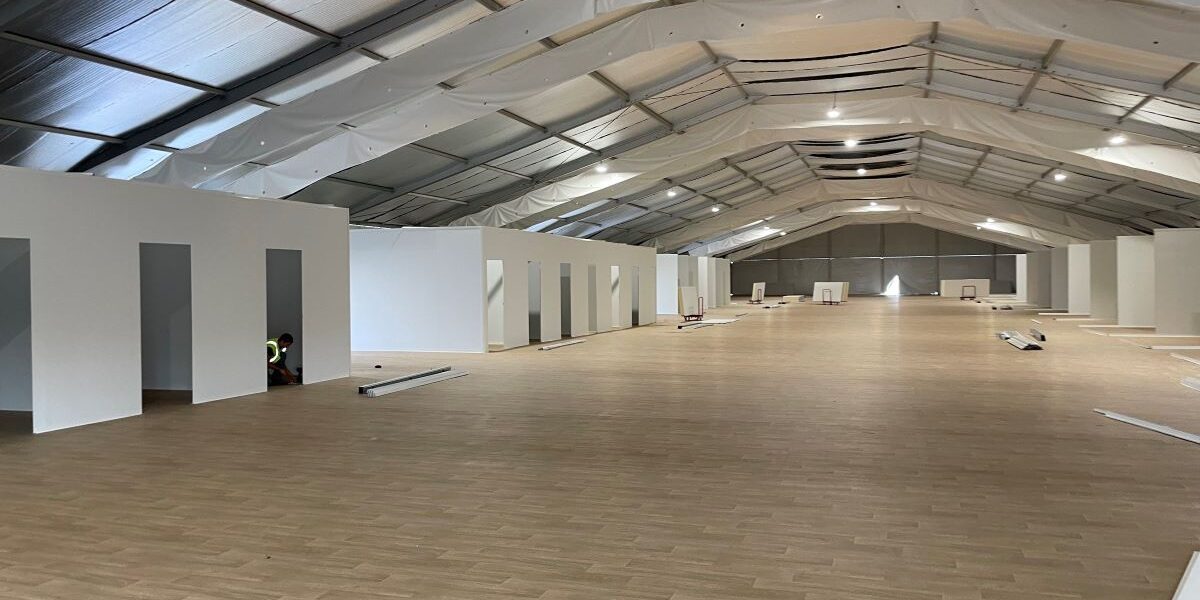By Jonathan Thomas
Churches have long been locations of sanctuary and support in their communities. Recently, they’ve begun to adopt more versatile solutions to expand their roles, especially in providing emergency housing and aid during disasters.
Enter the world of temporary modular walls – a groundbreaking solution that’s reshaping how churches offer humanitarian assistance.
This article explores the technical and practical benefits of these innovative walls, underscoring their importance in emergency response and disaster relief within church settings.
Adapting Sacred Spaces for Emergency and Humanitarian Needs
Modular Walls Are a Game-Changer for Emergency Housing
Churches are sacred places, traditionally reserved for worship and community gatherings. Now, they’re also becoming sanctuaries for those affected by disasters, thanks to modular walls. These temporary structures are quick to install, creating private areas for families and individuals in need.
What makes them particularly suitable for churches is their ability to adapt to different space requirements effortlessly.
The modular walls used in these transformations strike a balance between durability and environmental responsibility. They’re built to last and can be reused multiple times, which is economically and ecologically beneficial. Their no-waste feature is particularly appealing to churches committed to sustainable practices.
Flexibility in Design for Various Humanitarian Uses
Churches need adaptable spaces, especially when responding to emergencies. Modular walls offer just that.
These walls can be reconfigured quickly to suit different needs, from creating individual rooms for emergency housing to setting up larger areas for community support activities. This versatility is crucial in disaster relief, where needs can change rapidly.
The Technical Edge of Modular Walls in Emergency Responses
Ease of Installation: A Key Benefit
Time is critical in emergency situations. Modular walls, being lightweight and easy to install, are an advantage for churches.
They can be set up swiftly, transforming church halls into safe spaces for disaster relief or temporary housing. The simplicity of their installation means that even volunteers can erect these walls without needing specialized skills or tools.
In emergency housing scenarios, ensuring the privacy and safety of those affected is paramount. Modular walls create secure, private spaces within larger areas, which is essential for maintaining the dignity of those in distress. This aspect of safety and privacy helps build trust among those seeking refuge.
These walls aren’t just for immediate use; they are built to withstand repeated setups and teardowns. Their durability makes them a wise choice for churches that frequently engage in humanitarian work.
Real-World Impact and Future Perspectives
Churches Making a Difference
There are numerous instances where churches have successfully used modular walls. These real-world applications demonstrate the walls’ impact in emergency housing and community support. From small-scale setups to larger, more complex configurations, the success stories are many and varied.
The use of temporary walls signifies a shift in how churches participate in disaster relief and emergency housing. This evolution in their role – from solely offering spiritual guidance to providing practical aid – is a significant development. These walls enable churches to actively engage in and contribute to community support in times of crisis.
The trend of using modular walls in churches for humanitarian purposes is likely to gain momentum. As the need for adaptable, multipurpose spaces increases, so does the demand for these innovative solutions.
This trend highlights the ongoing need for creative and flexible approaches to community assistance during emergencies.
Modular Walls – A Vital Asset in Church Humanitarian Efforts
Modular walls are revolutionizing how churches respond to humanitarian crises.
Their ease of installation, flexibility, and durability make them an invaluable tool in transforming sacred spaces into safe havens for disaster relief and emergency housing.
Through the adoption of these walls, churches are demonstrating a deeper commitment to serving their communities in times of need.
The success stories and the potential for future applications emphasize the critical role these walls play in enhancing church-based humanitarian services.
Far from being a temporary solution, these modular walls represent a sustainable, adaptable approach to helping communities in distress, marking a new chapter in the role of religious institutions in providing essential humanitarian aid.
Jonathan Thomas is the marketing director for SwiftWall, which provides state-of-the-art, reusable, eco-friendly, fast, clean, engineered temporary wall solutions ideal for any place in need of temporary walls, www.swiftwall.com.














